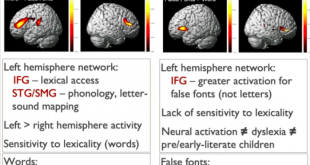Infographiceconintersect50 Cognitive Biases In The Modern World
Read More »IPA’s weekly links
Pick up your own 5-HTTLPR gene research summary shirt on etsy.Guest post by Jeff Mosenkis of Innovations for Poverty Action IPA’s looking for a Director of Poverty Measurement. In particular the job involves overseeing the Poverty Probability Index, a short, country-specific tool practitioners use to estimate poverty rates, and developing new non-monetary measures (requires strong quant background). Please share with anybody who might be interested.How the government of Odisha, one of...
Read More »IPA’s weekly links
Slide from Kaja Jasinska, who’s studying child neurodevelopment and reading in Côte d’Ivoire (link to conference video below)Guest post by Jeff Mosenkis of Innovations for Poverty Action Berk Ozler counts the numbers of men vs. women asking questions during a seminar speaker’s talk, and guess how the ratio came out (it’s worth also checking out the discussion below, including a code of conduct being considered at one department). In a follow-up to his informational intervention, he found a...
Read More »IPA’s weekly links
(From the video at the end of the post)Guest post by Jeff Mosenkis of Innovations for Poverty Action Oxfam releases a report around the same time as Davos every year on who owns what portion of global wealth. Their spin on it is designed to make headlines, but Dylan Matthews explains why it’s really hard to measure.Also in Vox, Stephanie Wykstra provides a nice plain-language summary of what the research says about microloans. A very cool very cross randomized experiment (more than 50...
Read More »Scott Barry Kaufman — What Would Happen If Everyone Truly Believed Everything Is One?
New research suggests a belief in oneness has broad implications for psychological functioning and compassion for those are outside of our immediate circle. Scientific American Blogs — Beautiful MindsWhat Would Happen If Everyone Truly Believed Everything Is One? Scott Barry KaufmanSee alsoHuffPostOur Models of Consciousness: How They Shape Our Reality Marjorie Woollacott | Emeritus Professor of Human Physiology and a member of the Institute of Neuroscience at the University of Oregon
Read More »Peter Kinderman — Six ‘Psychological’ Terms That Psychologists Never Use
It's short but if you don't choose to read it all, at least read the last one, "brainwashing." The ConversationSix 'Psychological' Terms That Psychologists Never UsePeter Kinderman | Professor of Clinical Psychology, University of Liverpool
Read More »IPA’s weekly links
Guest post by Jeff Mosenkis of Innovations for Poverty Action. Snot corn! That’s crop scientist Sarah Taber’s nickname for the variety of maize native Mexicans cultivated that allowed it to grow very high in very poor soil. According to a genetic sequencing published by UC Davis researchers, the secret is in the mucus-like goop around roots that are out in the open. The bacteria in the goop allow the plant to fix nitrogen from the atmosphere, effectively fertilizing itself from the air....
Read More »IPA’s weekly links
Guest post by Jeff Mosenkis of Innovations for Poverty Action. “Back in school we used to call it chew and pour,” he says. Meaning, for each possible question, the teacher gives you one correct answer to memorize — or “chew” — so that come test time, you can regurgitate it — “pour it” back to her verbatim. “And then,” adds Agbavor with a chuckle, “you forget about it. Nothing is retained.” That’s from one of my favorite podcasts, NPR’s Rough Translation, which is hosted by their former...
Read More »IPA’s weekly links
Guest Post by Jeff Mosenkis of Innovations for Poverty Action. Alex Tabarrok summarizes the story from the new book on RCTs, Randomistas, about how TOMS shoes invited an external evaluation of their program giving away shoes and discovered it wasn’t helping recipients very much. This isn’t that unusual in development, but faced with the evidence, they agreed to be named in the paper and be public about it, and tried to figure out how to use the insights to do better. (See study author Bruce...
Read More »Ilana Strauss — Does punishing people actually work?
The conundrum arises from assuming methodological individualism based ontological individualism when humans are social animals embedded in a complex adaptive system in which increasing rate of coordination yield increasing return on coordination. Basic evolutionary biology, and team work in organizational behavior. Methodological individualism based on the "ontology of common sense" is similar to naive realism based on the "epistemology of common sense." Naive realism holds that...
Read More » Heterodox
Heterodox




